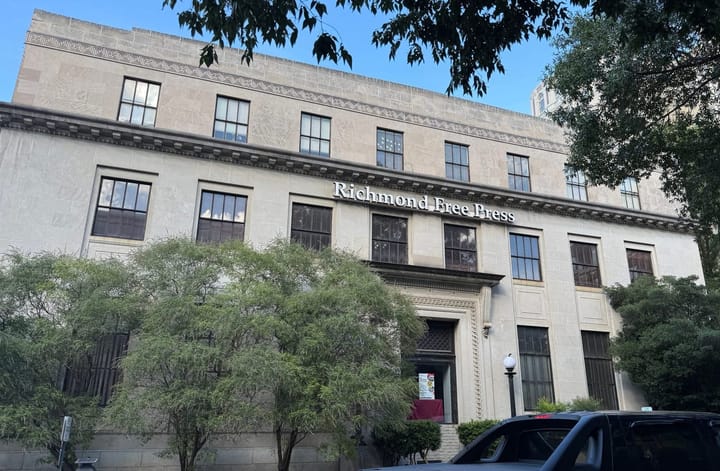
Former city spokesperson’s ‘lost’ phone is latest sticking point in transparency lawsuit
To figure out whether the city of Richmond has or hasn’t turned over all text messages relevant to an ongoing lawsuit over transparency and alleged whistleblower retaliation at City Hall, a local judge took a look at two city-issued phones herself.
Lawyers representing the city had previously said there were no text messages on a work cell phone used by former city spokesperson Petula Burks relevant to the lawsuit brought by former city employee Connie Clay, who worked under Burks as Richmond’s Freedom of Information Act officer.
As it turns out, according to testimony at a court hearing Wednesday, there were almost no text messages on Burks’ phone at all.
Lawyers for the city said the phone was nearly empty because Burks misplaced her original work phone last year shortly before she left city government.
“Ms. Burks lost her phone in New York at the airport,” said Jimmy F. Robinson Jr., an attorney with the Ogletree Deakins firm who is representing Burks and the city in the case.
Instead of the contents of the missing phone being restored, Robinson said Burks apparently started clean with a new device.
The revelation that text messages might have gotten lost because of a lost phone is the latest wrinkle in a high-profile lawsuit related to the city’s struggles to comply with public-records laws. Because text messages about government business are considered public documents that must be preserved under FOIA, the court battle is raising new questions about what policies the city has in place to ensure cell phone records aren’t destroyed or made inaccessible.
Clay alleges she was wrongfully fired for pointing out the city was routinely violating FOIA, but the city’s lawyers argue she’s not a whistleblower and was let go for being generally difficult to work with and unfit for the role.
Clay’s attorneys have been trying for months to gain access to all city records that could shed light on what motivated the firing. Because it was Burks who fired Clay in January of 2024, text messages she exchanged with other city officials could help answer that question.
Sarah Robb, an attorney representing Clay, pointed out Wednesday that the city had an obligation to preserve text messages under FOIA law and should not allow them to be lost or discarded simply because a physical phone has disappeared. That duty to preserve records was even stronger with the phone in question, Robb said, because by the time Burks lost the phone, Clay had already filed her lawsuit that named Burks as a defendant.
“Now we have a blank phone,” said Robb, who argued the city should still have access to digital copies of the text messages even if the original phone is gone.
According to a court filing, there were no text messages on Burks’ phone before June 25 of 2024, one week before Burks left City Hall. Clay filed her lawsuit in March of 2024.
The Richmonder is powered by your donations. For just $9.99 a month, you can join the 1,000+ donors who are keeping quality local journalism alive in Richmond.
It was apparently news to Circuit Court Judge Claire Cardwell that the city-issued phone she was given to review for possible evidence wasn’t the one Burks actually used during most of the key events in dispute. The judge said she was “disturbed” to learn that the city had been able to find at least one text message from the reportedly lost phone that wasn’t on the device she searched.
The judge instructed the city’s attorneys to double-check whether there was a way to digitally retrieve the contents of the missing phone. The city’s lawyers previously indicated that might be possible, but said it could require the purchase of costly technology the city didn’t have.
Cardwell also ordered additional searches to be done on the work phones of other city officials alleged to be involved in the matter — including former deputy chief administrative officer Sabrina Joy-Hogg and former finance director Sheila White — to see if their phones contained any text exchanges with Burks about Clay.
“You are to say what you did, what you were looking for and what you found,” Cardwell told the city’s attorneys.
Robinson, the lead attorney for the city, insisted there had been no effort to hide documents.
“We don’t even know if there are text messages,” Robinson said. “But if there are, we want to make sure that they get them.”
Bitter disputes over the production of witnesses and evidence derailed a trial in the Clay case that was supposed to start this week. The trial was pushed back nine months, and is now set to begin next June.
Clay’s team has accused the city of using stall tactics to delay Clay’s pursuit of justice. The city’s attorneys say the problems have arisen mostly from missteps and unreasonable requests by Clay’s own lawyers.
Cardwell is caught in the middle, and the judge again showed her exasperation with the attorneys Wednesday by saying they can’t even seem to agree on “when the sun is out.” She urged both sides to stick to the facts and refrain from personal attacks.
“It’s unpleasant to practice law like that,” Cardwell said.
Because the lawyers and the judge already had set aside time this week, the purpose of Wednesday’s hearing was to let the judge resolve some of the lingering disputes.
In addition to ordering a deeper look for text messages, Cardwell ordered the city’s lawyers to make Burks available for another four hours of questioning by Clay’s team.
The judge had ordered a two-day deposition of Burks to happen earlier this month, but the city’s attorneys took it upon themselves to call off the second day due to a scheduling mixup with a court reporter who was supposed to attend to take down a transcript.
Cardwell told Robinson Wednesday that he had acted unreasonably by telling Burks she could leave the deposition without even waiting an hour for the court reporter issue to be resolved.
Robinson protested that he had not improperly cut off the deposition because it was never underway to begin with. He said Burks shouldn’t be “punished” or “penalized” because a court reporter didn’t show up to a deposition run by Clay’s lawyers.
Cardwell was unswayed.
“You terminated the deposition. And you did so without consulting with the court,” Cardwell said. “The inconvenience to your client is because of you.”
The next hearing in the case is set for Nov. 18.
Contact Reporter Graham Moomaw at gmoomaw@richmonder.org






